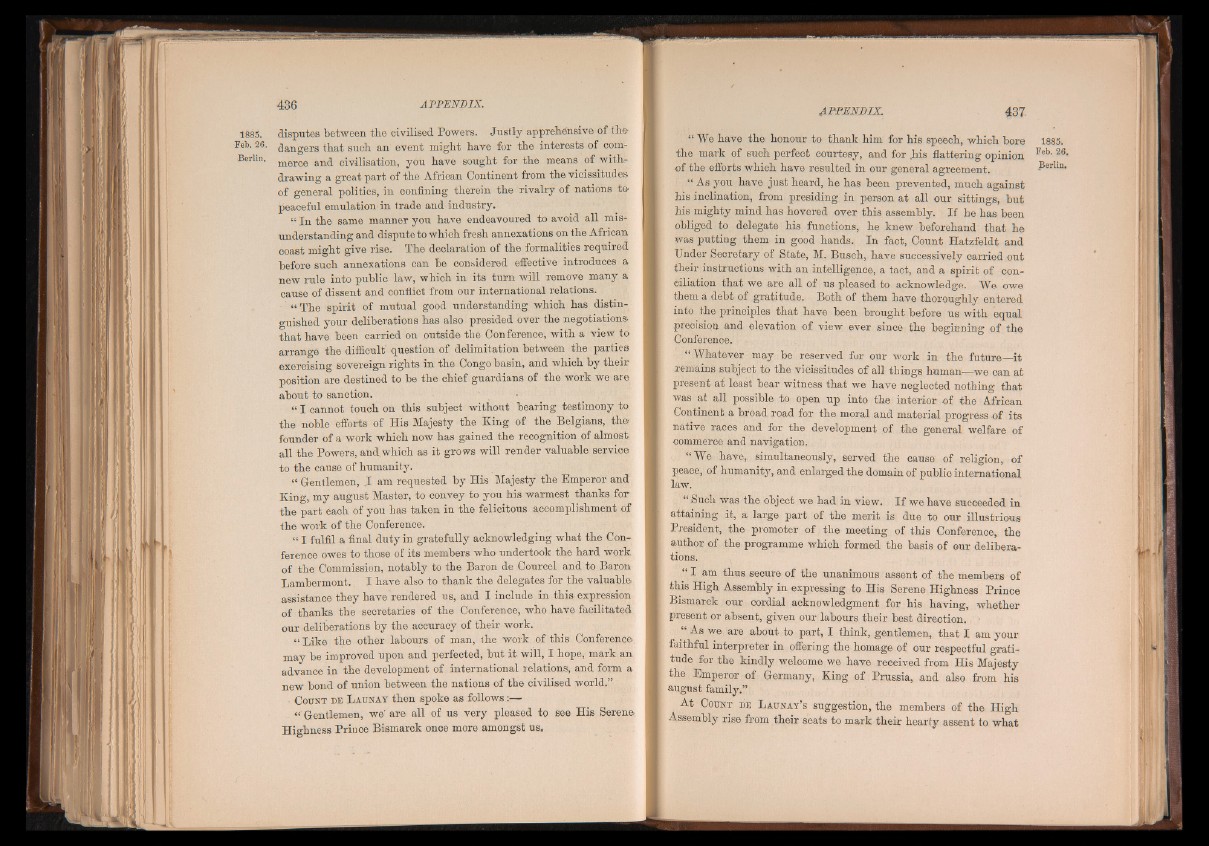
disputes between the civilised Powers. Justly apprehensive of the
dangers that such an event might have for the interests of commerce
and civilisation, you have sought for the means of withdrawing
a great part of the African Continent from the vicissitudes
of general politics, in confining therein the rivalry of nations to
peaceful emulation' in trade and industry.
“ In the same manner you have endeavoured to avoid all misunderstanding
and dispute to which fresh annexations on the African
coast might give rise. The declaration of the formalities required
before such annexations can be considered effective introduces a
new rule into public law, which in its tu rn will remove many a
cause of dissent and conflict from our international relations.
“ The spirit of mutual good understanding which has distinguished
your deliberations has also presided over the negotiations
th a t have been carried on outside the Conference, with a view to
arrange the difficult question of delimitation between the parties
exercising sovereign rights in the Congo basin, and which by th e ir
position are destined to be the chief guardians of the work we are
about to sanction. •
“ I cannot touch on this subject without bearing testimony to
the noble efforts of His Majesty the King of the Belgians, th e
founder of a work which now has gained the recognition of almost
all the Powers, and.which as it grows will render valuable service
to the cause of humanity.
“ Gentlemen, .1 am requested by His Majesty the Emperor and
King, my august Master, to convey to you his warmest thanks for
the part each of you has taken in the felicitous accomplishment of
the work of the Conference.
“ I fulfil a final duty in gratefully acknowledging what the Conference
owes to those of its members who undertook the hard work
of the Commission, notably to the Baron de Courcel and to Baron
Lambermont. I have also to thank the delegates for the valuable
assistance they have rendered us, and I include in this expression
of thanks the secretaries of the Conference, who have facilitated
our deliberations by the accuracy of their work.
“ Like the other labours of man, the work of this Conference
may be improved upon and perfected, but it will, I hope, mark an
advance in the development of international relations, and form a
new bond of union between the nations of the civilised world.”
C ount d e L a u n a y then spoke as follows:—
“ Gentlemen, we' are all of us very pleased to see His Serene
Highness Prince Bismarck once more amongst us,
“ We have the honour to thank him for his speech, which bore
the mark of such perfect courtesy, and for Jh.xs flattering opinion
of the efforts which have resulted in our general agreement.
“ As you have just heard, he has been prevented, much against
his inclination, from presiding in person a t all our sittings, but
his mighty mind has hovered over this assembly. I f he has been
obliged to delegate his functions, he knew beforehand th a t he
was putting them in good hands. In fact, Count Hatzfeldt and
Under Secretary of State, M. Busch, have successively carried out
their instructions with an intelligence, a tact, and a spirit of conciliation
th a t we are all of us pleased to acknowledge. We owe
them a debt of gratitude. Both of them have thoroughly entered
into the principles th a t have been brought before us with equal
precision and elevation of view ever since the beginning of the
Conference.
“ Whatever may be reserved for our work in the future it
remains subject to the vicissitudes of all things human—we can at
present af least bear witness th a t we have neglected nothing that
was at all possible to open up into the interior of the African
Continent a broad road for the moral and material progress c f its
native races and for the development of the general welfare of
commerce and navigation.
“ We have, simultaneously, served the cause of religion, of
peace, of humanity, and enlarged the domain of public international
law.
Such was the object we had in view. I f we have succeeded in
attaining it, a large part of the merit is due to our illustrious
President, the promoter of the meeting of this Conference, the
author of the programme which formed the basis of our deliberations.
“ I am thus secure of the unanimous assent of the members of
this High Assembly in expressing to His Serene Highness Prince
Bismarck our cordial acknowledgment for his having, whether
present or absent, given our labours their best direction.
“ As we are about to part, I think, gentlemen, th a t I am your
faithful interpreter in offering the homage of our respectful gratitude
for the kindly welcome we have received from His Majesty
the Emperor of Germany, King of Prussia, and also from his
august family.”
At C ount d e L a u n a y ’s suggestion, the members of the High
Assembly rise from their seats to mark th eir hearty assent to what